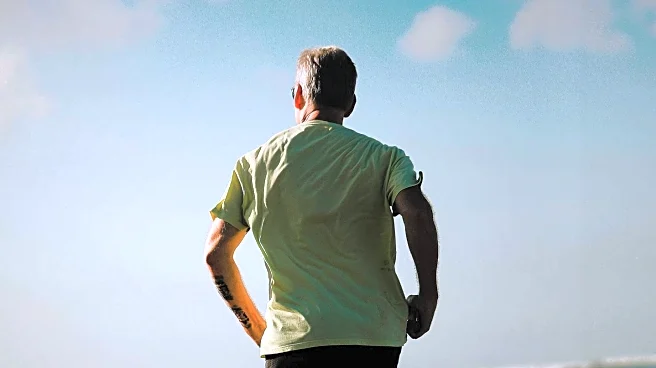What's Happening?
Recent research has identified 12 interconnected biological hallmarks that define the ageing process, highlighting how exercise can counteract each one. Originally, a 2013 study outlined nine cellular
processes that deteriorate with age, contributing to frailty and disease. By 2023, researchers added three more processes to this list. Exercise has been shown to combat these ageing processes by enhancing DNA repair, maintaining telomere length, and improving mitochondrial function. It also boosts the body's antioxidant defenses, reduces inflammation, and promotes cellular recycling through autophagy. These findings suggest that exercise not only slows down the ageing process but also improves overall health by preventing or treating chronic diseases.
Why It's Important?
The implications of this research are significant for public health and individual well-being. As the U.S. population ages, understanding how to mitigate the effects of ageing becomes increasingly important. Exercise emerges as a powerful tool to enhance longevity and quality of life, potentially reducing healthcare costs associated with age-related diseases. By improving cellular function and reducing inflammation, exercise can help prevent conditions such as cancer, diabetes, and heart disease. This positions exercise as a critical component of preventive healthcare strategies, benefiting individuals and society by promoting healthier, longer lives.
What's Next?
The next steps involve integrating these findings into public health policies and individual health practices. Healthcare providers may increasingly recommend exercise as a preventive measure against ageing-related diseases. Further research could explore specific exercise regimens that maximize these anti-ageing benefits. Additionally, public health campaigns might focus on increasing physical activity levels across all age groups to harness the full potential of exercise as a natural intervention against ageing.
Beyond the Headlines
This research underscores the broader cultural shift towards viewing exercise not just as a means of physical fitness, but as a holistic approach to health and longevity. It challenges traditional perceptions of ageing as an inevitable decline, offering a proactive strategy to maintain vitality. The findings also raise ethical considerations about access to exercise opportunities, highlighting the need for inclusive policies that ensure all demographics can benefit from these health advantages.








